Israel to intensify airstrikes after aid enters Gaza
5 min readIsrael’s military said Saturday it would intensify strikes on Hamas-controlled Gaza ahead of a planned ground invasion, as UN agencies warned of a “catastrophic” humanitarian situation in the blockaded territory.
A first trickle of aid entered the Palestinian enclave from Egypt on Saturday, but the 20 trucks permitted to cross have been described as a “drop in the ocean” given the needs of 2.4 million residents.
The military has pounded Gaza with relentless strikes in response to Hamas’s murderous October 7 attack, in which militants killed at least 1,400 people, mostly civilians who were shot, mutilated or burnt to death, according to Israeli officials.
The bombing campaign has killed more than 4,300 Palestinians, mainly civilians, according to the Hamas-run health ministry, and reduced swathes of the densely-populated territory to smouldering ruins.
Over 40 percent of all housing has been damaged or destroyed, according to the UN citing local authorities, and Israel has halted the delivery of food, water, fuel and electricity.
Israel will now intensify its bombardment, to minimise the risks to its troops when they begin a ground invasion, military spokesman Admiral Daniel Hagari said.
“From today, we are increasing the strikes and minimising the danger,” he said. “We will increase the attacks and therefore I called on Gaza City residents to continue moving south for their safety.”
Israel has warned more than one million residents of the northern part of Gaza to move south for their safety, and the UN says more than half the enclave’s population is now internally displaced.
Bombardment has continued in southern parts of the Strip though, with Hamas authorities reporting nine killed in an airstrike in Khan Younis overnight.
Hundreds of thousands of civilians are believed to remain in and around Gaza City in the north, unwilling or unable to leave.
Qatar negotiating for hostage releases
Israeli troops have massed on the border with Gaza and commanders visited frontline units on Saturday to rally troops.
“We will enter Gaza,” chief of staff Lieutenant General Herzi Halevi told one infantry brigade on a visit.
“Gaza is densely populated, the enemy is preparing a lot of things there – but we are also preparing for them,” Halevi said.
A ground invasion poses myriad challenges for Israeli troops, who are likely to be confronted by Hamas booby traps and tunnels in a densely packed urban environment.
The safety of over 200 hostages abducted by Hamas on October 7 and held in Gaza is another complicating factor.
Two American hostages were released on Friday evening, after mediation from Qatar, which said more could be freed “very soon.”
“We are taking a path that will very soon lead to release of the hostages, especially civilians,” Qatari foreign ministry spokesman Majed Al-Ansari told the German Welt am Sonntag newspaper Saturday.
“We are currently working on an agreement under which all civilian hostages will be initially released,” he added.
After negotiations and US pressure, 20 trucks carrying food and medicine, but no fuel, crossed from Egypt into Gaza on Saturday.
The crossing closed afterwards, and UN officials warned much more was needed. “Gaza was a desperate humanitarian situation before the most recent hostilities,” five UN agencies said in a statement.
“It is now catastrophic. The world must do more.”
‘Something needs to be done’
At a peace summit organised by Egypt, UN chief Antonio Guterres again pleaded for a humanitarian ceasefire “to end this godawful nightmare.”
In a sign of international divisions however, the meeting was unable to agree any joint call, with Western officials demanding a clear condemnation of Hamas, and Arab attendees opting to issue their own statement criticising world leaders.
Inside Gaza, shellshocked residents said they were unsure where to go or how to protect their families.
“Even in my worst nightmares, I never thought this could be possible,” said Rami Abu Wazna, staring at the destruction in central Gaza’s Al-Zahra neighbourhood.
The scale of the bombing has left basic systems unable to function, with the UN reporting around 40 unidentified bodies were buried in a mass grave in Gaza City on Saturday because cold storage ran out before they could be identified.
Across the border in Israel’s Kibbutz Beeri, where Hamas militants killed 10 percent of the population, preparations were underway for funerals on Sunday.
Romy Gold, 70, said residents were still struggling to comprehend the horror of their experience.
“Around us whole families were shot or butchered or burned alive,” he told AFP. Like many, he feels the ground invasion of Gaza “cannot come fast enough. Something needs to be done.”
“We need some kind of assurance that it will not happen again,” he said.
‘Better to leave now’
The conflict has sparked fears of a wider conflagration, with Israeli raids and settler attacks killing dozens of Palestinians in the West Bank.
Israel’s military said Sunday it targeted “terror operatives” with an airstrike on a mosque in the West Bank’s Jenin, where it said a group of Hamas and Islamic Jihad militants were planning fresh attacks.
One person was killed and three injured in the strike, the Palestinian news agency Wafa said, citing the local Red Crescent.
Exchanges of fire also continued across Israel’s northern border with Lebanon, where the military has traded strikes with militant group Hezbollah.
In south Lebanon, Hezbollah said four of its fighters were killed, along with a member of Palestinian Islamic Jihad.
Israeli authorities reported three soldiers wounded, one of them seriously, in Hezbollah anti-tank fire on the village of Baram, and two Thai farm workers were also wounded.
Western leaders have warned Hezbollah against intervening in the conflict, but the group’s number two said it stood ready to step up involvement.
“Let’s be clear, as events unfold, if something comes up that calls for greater intervention by us, we will do so,” Naim Qassem said.
Israel has evacuated dozens of northern communities, and nearly 4,000 people in Lebanon have fled border areas for the southern city of Tyre.
“All my children are young. If the apocalypse comes, how will I get them all out in one go?” said Mustafa al-Sayyid, in a classroom stripped of desks and dotted with thin mattresses. “So I thought, better to leave now.”
For the latest news, follow us on Twitter @Aaj_Urdu. We are also on Facebook, Instagram and YouTube.




















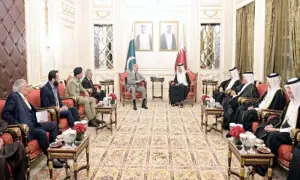
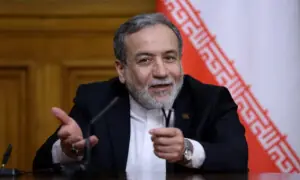
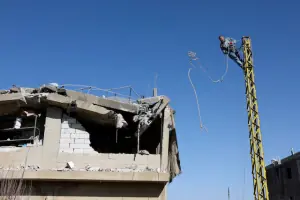

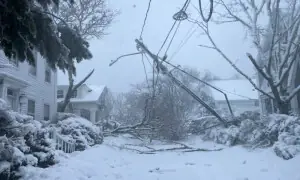

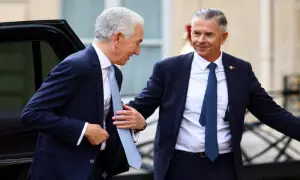
Comments are closed on this story.